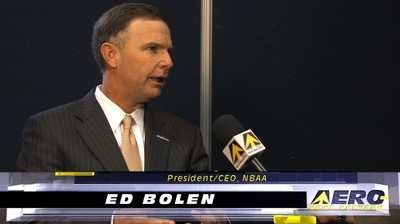Against Overwhelming Opposition, Officials Move to Dismantle
Program
If you had any doubts as to whether or not the powers-that-be in
Washington had little or no concern for the aviation industry (or
much of the private business world, for that matter), here is yet
more proof that things have gone seriously wrong in the District Of
Colombia. The damage that our lawmakers have done to this industry
is ponderous... and the hits just keep on coming...

NBAA has strongly denounced a decision, announced by government
officials late Friday afternoon, to push ahead with what has been
dubbed a "Paparazzi Protection Rule" - a plan to virtually
eliminate a decade-old "do not track" program for the operators of
private aircraft.
"We are outraged at the government's move," said NBAA President
and CEO Ed Bolen. "As we've said repeatedly, there can be no
legitimate reason for a government agency to facilitate the
monitoring of wholly private activity by anyone with an internet
connection. This incomprehensible policy reversal gives anyone in
the world - terrorist, criminal, tabloid stalker, business
competitor - the equivalent of an internet homing device to track
the movements of citizens and companies in real time."
Bolen went on to reject the claim - made in a May 27 press
release revealing the government's plans for dismantling the Block
Aircraft Registration Request (BARR) program - that publishing an
airplane tail number doesn't reveal the identity of the travelers
aboard.
"That argument is pure sophistry," Bolen said. "With an aircraft
tail number, anyone with a little initiative can quickly determine
the travelers on an aircraft." To illustrate his point, Bolen cited
a front-page article, published in The Wall Street Journal on May
21, that describes the flying patterns of numerous citizens and
companies based on tail-number information alone.
 Bolen noted that Congress enabled the BARR program out of the
recognition that getting on an airplane should not be tantamount to
forfeiting security or privacy. "That's why the House of
Representatives, thousands of individuals and companies and
organizations including the U.S. Chamber of Commerce, the National
Association of Manufacturers and the Business Roundtable have
opposed the government's gratuitous invasion of privacy rights," he
said.
Bolen noted that Congress enabled the BARR program out of the
recognition that getting on an airplane should not be tantamount to
forfeiting security or privacy. "That's why the House of
Representatives, thousands of individuals and companies and
organizations including the U.S. Chamber of Commerce, the National
Association of Manufacturers and the Business Roundtable have
opposed the government's gratuitous invasion of privacy rights," he
said.
Bolen pointed out that the move also puts the government on a
slippery slope when it comes to privacy protections. "If this rule
passes," he asked, "What's to stop the government from releasing
the records on drivers' E-Z pass use on highways, passenger
manifests for airline flights, individuals' cell-phone calling
traffic, and consumers' credit card use?
"What is most puzzling about this rule is that the Obama
administration has pledged to increase privacy protections, not
diminish them," Bolen said. "But here, government officials have
chosen to sidestep the original intention of the U.S. Congress, the
voices of thousands of citizens and companies, and a basic
responsibility to safeguard the right to privacy in favor of a rule
to invade the privacy and security of passengers in order to cater
to tabloid special interests and others with suspect motives. When
it comes to privacy rights, this is not the kind of change that the
American people want."
 Aero-News: Quote of the Day (10.27.25)
Aero-News: Quote of the Day (10.27.25) ANN's Daily Aero-Linx (10.27.25)
ANN's Daily Aero-Linx (10.27.25) NTSB Prelim: Lancair 320
NTSB Prelim: Lancair 320 Airborne Programming Continues Serving SportAv With 'Airborne-Affordable Flyers'
Airborne Programming Continues Serving SportAv With 'Airborne-Affordable Flyers' Airborne-Flight Training 10.23.25: PanAm Back?, Spirit Cuts, Affordable Expo
Airborne-Flight Training 10.23.25: PanAm Back?, Spirit Cuts, Affordable Expo




